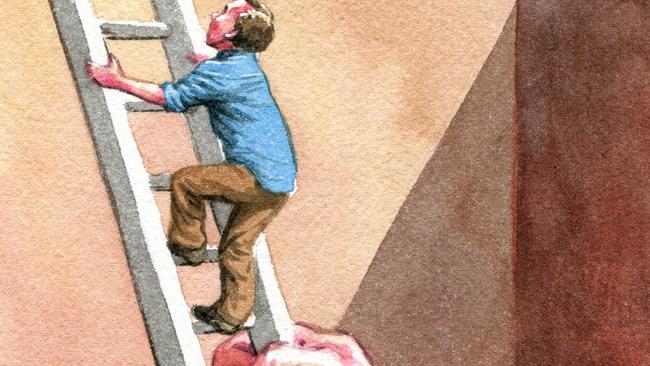
WHEN our friends at the Australian Council of Social Service tell us that one in seven Australians is living in poverty it is hard to disagree. Certainly not in public anyway, where to quibble about the definition of poverty would be considered mean-spirited. Social justice, like reconciliation and diversity, is a secular article of faith, a topic one must tiptoe around for fear of causing offence.
For the record, ACOSS draws the poverty line at half the median income. After taking account of housing costs the report finds that if a single person’s income dips below $400 a week, they have “fallen into poverty”.
What, if anything, should be done about it? ACOSS’s report, Poverty in Australia 2014, released on Sunday, is hesitant on that point, although a spirited introduction by John Falzon, chief executive of St Vincent de Paul, suggests a people’s uprising may be in order.
“Politics, as we know, is just a concentrated form of economics,” writes Falzon. “Our task, therefore, is to transform our personal stories of injustice into a powerful, collective struggle for a new society; a society in which people are not blamed because economic structures lock them out or, in some cases, lock them up; one in which people are not told that they would not be poor if only they chose to be a little more productive.”
There’s more, but you get the drift. The system is to blame. Poverty is a slough of despond into which helpless and hopeless victims fall while flint-hearted governments turn their backs.
Welfare, we once imagined, was the key to winning the war against want. Yet if the accumulation of human misery in Australia is as bad as this report implies, we are getting poor value for money. Spending per capita on welfare, adjusted for inflation, is five times higher than it was in 1947, yet the poor are with us still.
In fact, they are with us in ever increasing numbers. In 1947, one in 83 of the working-age population claimed an invalid pension. Today the figure is one in 19. In other words, despite all the benefits of occupational health and safety, modern medicine and the increasingly sedentary nature of the workplace, the proportion of the workforce considered physically or mentally incapable of earning a living has increased fivefold since World War II.
Not surprisingly, welfare reform is high on the priority list whenever politicians and policy experts ponder what needs fixing in this country, yet this government, like others before it, will find the politics of entitlement awkward. The iron law of welfare reform is that if there is an unintended consequence or a hard-luck story the welfare lobby will find it and turn it into a press release. That’s just the way life is.
Reform is even harder for politicians on the Right who risk being typecast as money-grubbing Tories who would happily eat their young.
With hindsight it was unfortunate that the Abbott government’s first forays into welfare reform were announced with the budget and became entangled in the fiscal debate. Yet there is something deeply unconvincing about the welfare sector’s claim to occupy the moral high ground in this debate.
Patrick McClure’s interim report to the government makes clear what we already know, that the welfare system is cumbersome, piecemeal, inefficient and wasteful. There is nothing remotely virtuous in leaving the dignity-sapping institution of public handouts as it is.
Let’s get real for a moment. Does anyone seriously think that if we doubled welfare expenditure from $144 billion a year to $288bn it would offer the slightest relief to those who are ground down by the friction of everyday life? It would, in all likelihood, make a bad situation worse, for that is the paradoxical effect of welfare. It is the great benevolence dilemma: how does one help the downtrodden without sapping their resolve?
The ACOSS poverty report feeds the common misconception that welfare is simply the relief of financial hardship. Yet the most important gift we can give those who struggle to rise above their own misfortune is not cash but resilience.
We must recognise their need for assistance while avoiding the tyranny of low expectations. Everyone deserves the right to alter the course of their life for better or for worse. Few incapacities are so severe that they destroy any chance of a job.
As McClure wrote in The Australian yesterday in the context of mental illness, “meaningful work is often a critical part of the recovery process. A social system that recognises this, and is flexible, is fundamental to welfare reform.”
The language of victimhood has become so entwined in this politically correct discussion that it takes courage to make McClure’s simple point.
Many in the welfare sector shudder at the Prime Minister’s call for “lifters not leaners”, a phrase borrowed from Robert Menzies’ 1942 Forgotten People speech. Yet Menzies’ Calvinist values gave him a moral clarity missing from the present debate. Menzies avoided economic arguments. It was a matter of principle: “leaners grow flabby; lifters grow muscles. Men without ambition readily become slaves.”
In a later talk in the Forgotten People series, Freedom from Want, Menzies acknowledges the community’s “great and imperative obligations to the weak, the sick, the unfortunate” and the need to give them all the support they require. Yet he goes on to say, “the state cannot and must not put a premium on idleness or incompetence. To every good citizen the state owes not only a chance in life but a self-respecting life.”
The McClure report provides a solid policy framework for welfare reform, but it is unlikely to go very far unless the Liberals are able to mount the moral case. They could do worse than look to the party’s founder for assistance.
The moral high ground is there for the taking.
Nick Cater is executive director of the Menzies Research Centre.


